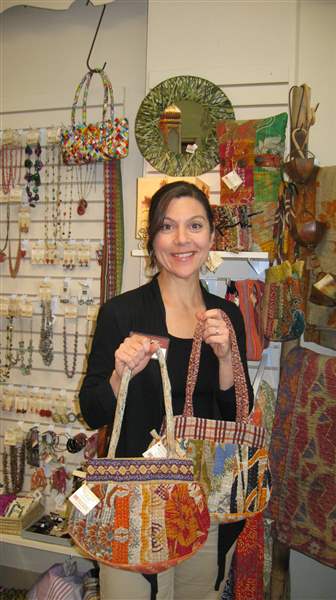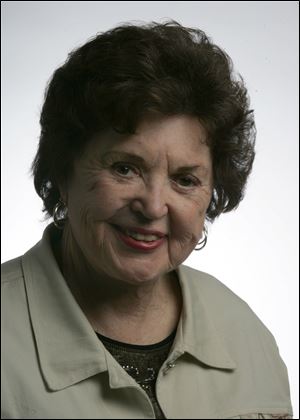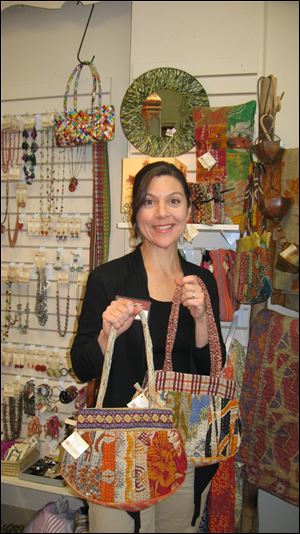
COMMENTARY
Shop in Archbold offers unusual items and a helping hand
12/1/2013
Elizabeth Zilba Baer holds fabric purses made of saris.

Mary Alice Powell
Updated Dec. 2, 2013 at 2:07 a.m. to reflect the following change: The Mennonite Central Committee is headquartered in Akron, Pa.
ARCHBOLD — The skillful hands and creative minds of people in 38 countries come together in incredible artistry at Ten Thousand Villages in Archbold.
Open for eight years on Defiance Street, it is one of 80 similar stores in the United States where products made in Africa, Asia, Latin America, and the Middle East are sold through a fair trade policy.
I have visited the unique shopping mecca twice and received the grand tour from manager Elizabeth Zilba Baer, so the retail store that brings a global marketplace to northwest Ohio is more than a place for hand-crafted gifts.
The stories of the people who make the items in artisan groups around the world are heart rending and add to the reason for the purchase. A printout of the country of origin and history of the product is given with each purchase. The information is especially useful to include with a gift, but it is also good for personal reference.

Elizabeth Zilba Baer holds fabric purses made of saris.
As an example, from the hundreds of attractive items that are displayed, I bought an inexpensive chain to hold my reading glasses on my neck because I am always losing them.
The chain is pretty and does the job, but the intrigue of the $18 purchase was reading about the origin of the Chroma Eyeglass Holder. It was made in India by TARA Projects located near Delhi. It is one of the largest fair trade organizations and was established in 1973 to defend the rights of the poor. Its membership includes 35 community artisan groups and family workshops.
The mission of Ten Thousand Villages is to provide thousands of disadvantaged people in Third World countries with consistent income and to improve their quality of life.
The company was incorporated as an independent nonprofit charitable organization in 2002, but it has deep roots in the mission work of the Mennonite Central Committee that is headquartered in Akron, Pa. The concept dates to 1946 when Edna Ruth Byler, of Ephrata, was on a mission to Puerto Rico for MCC.
Ms. Byler was so impressed with the needlework the disadvantaged women were making, she took some of the work home and sold it from the trunk of her car and through churches and sent the profits back to Puerto Rico. The effort eventually evolved into Ten Thousand Villages and it remains in partnership with the Mennonite organization.
According to Ms. Baer, the artisans receive 50 percent when an order is placed and payment in full when the order is shipped. It’s obvious that Ms. Baer, a former Perrysburg resident, has found her niche in management. She repeatedly tells customers, “I love it here” and enjoys showing merchandise and always has a story about the origin of each product. She also expressed praise for the volunteers who work in the store.

Large hand-woven baskets are from Baghdad.
She considers a collection of fabric purses and throws made of saris by women in Bangladesh as an excellent example of how the unfortunate have found ways to utilize the little that they have available to them to make and sell goods. According to Ms. Baer, the women are members of the Sacred Mark Artisan Group who have escaped sex trafficking.
Other impressive pieces are made with what most people would consider trash and are in keeping with the company policy that recycled or locally sourced materials be used. “Our goal is to leave a light footprint on the earth,” she said.
Sturdy candleholders from India are made of bicycle chains. Jewelry made by HIV patients in Ethiopia were once bullet cases. Soda cans were twisted, turned, and fashioned into handsome Menorahs by creative people in South Africa.
The holidays are recognized throughout the store with nativity sets from around the world in several sizes and in a variety of materials. One nativity of hand-carved olive wood from the West Bank was a favorite.
Hours are Monday through Friday, 9:30 a.m. to 5:30 p.m.; Saturday, 9:30 a.m. to 3 p.m., and closed Sunday. Other Ten Thousand Villages are in Bluffton, Ohio, and Ann Arbor.
Mary Alice Powell is a retired Blade food editor.
Contact her at: mpowell@theblade.com